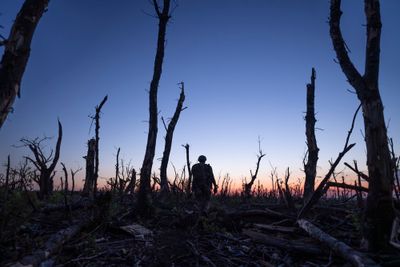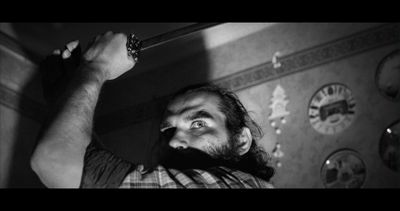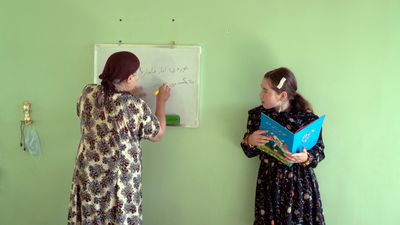A Ukrainian platoonʼs mission: traverse a heavily fortified mile of forest to liberate a strategic village from Russian forces. A journalist accompanies them, witnessing the ravages of war and the growing uncertainty about its conclusion.
Awards:
Directing Award in the category of World Cinema, Documentary – Sundance Film Festival 2025 in Park City & Sundance Resort, Utah (USA)
F:ACT Award – CPH:DOX Copenhagen 2025 (Denmark)
Best International Film in the International Competition – DocAviv Film Festival in Tel Aviv (Israel)
The screening of the film will be preceded by the grand opening of the festival, combined with the presentation of the Elena Lacková Award. The evening will be hosted by Katarína Strýčková.
The grand opening will be held in Slovak and will be interpreted into Slovak sign language and English.
The film will be screened in cooperation with the Ukrainian Institute.

How does it feel to complete a new Slovak documentary film? How long does it take? What does a filmmaker take away from it, and what does it take away from the filmmaker? How does the filmmaker’s relationship to the subject evolve during the creative process? And once the film is finished, can they count on succeeding at international festivals? Join us for a live discussion, also broadcast on Radio Devín, with three documentary filmmakers whose films will premiere at this year’s One World festival.
Guests:
Tomáš Bača, director of the film Where the Stork Lands with Amália
Diana Fabiánová, director of the film Open
Andrea Kalinová, director of the film Replanted
Eva Križková, director of the One World festival
Hosted by Zuzana Golianová. The discussion will be conducted in Slovak and will be interpreted into Slovak sign language.
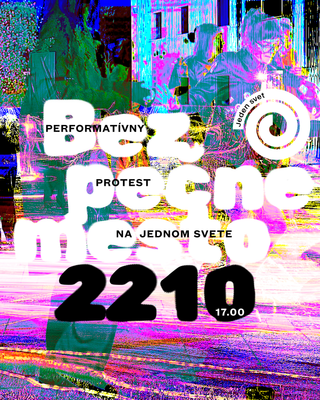
Date & Time: 22 October, 5:00 PM
Place: Velvet Revolution Square
To whom does the city belong? Join a dance-performance march through the city and experience what it feels like to walk the streets without fear.
Together we’ll learn a simple choreography that will become our shared language. We’ll walk, slow down, dance, and celebrate the idea of a city and a country where we all feel safe.
We protest, we dance, above all we come together.
A feminist city and an open country – may they be a human right, not just a wish.
Route: From SNP Square we’ll head together to the Lumière cinema.
After the march, there will be a screening of the documentary Million Moments, which follows the journey of the Million Moments for Democracy movement – from the mass protests at Letná plain to deeper questions of what truly matters. The screening will be followed by a discussion reflecting on the crisis of democracy and the role of civic initiatives in society. Do they stand a chance to change anything? And where is the line between civic activism and politics, and what happens if someone crosses it?
Guests:
• Mikuláš Minář, co-founder of the association A Million Moments for Democracy
• Amálie Kovářová, director of the film Million Moments
• Katarína Mišíková, Open Culture!
Hosted by Lukáš Osvald, People in Need
Tickets to the film: https://jedensvet.cinepass.sk/sk/tickets/?day=all
Choreography & Text: Zuzana Psotková / Music: Alex Gutrai & Ján Mikuš / Vocals: Ľudmila Klimková / Production & Protest know-how: Verona Němcová / Costumes & Visuals: Alexandra Tamásová, Verona Němcová / Concept: AW Team
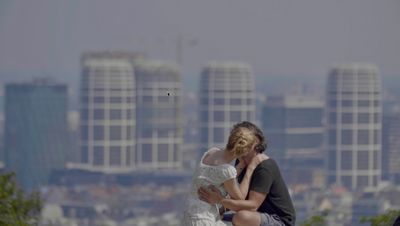
A love story without a filter. – In Slovakia, some things just aren’t discussed at home. Infidelity is either overlooked or punished. Honesty is mistaken for weakness. And monogamy? No one questions whether it is for everyone – it is assumed. The film Open untangles a relationship within one family and holds up a mirror to all of society at the same time. It is a story about a love seeking its shape beyond usual forms of cohabitation. Without a filter. Without shame. With heart.
The screening will be followed by a discussion in Slovak:
Slovak families are full of secret stories and silence, which influence our relationships more than we are willing to admit. The documentary film Open directed by Diana Fabiánová deals with sensitive matters of love, trust, and lies. After the film screening, weʼll try to define what family secrets mean for individuals and society, and how to start talking about them.
Guests:
Diana Fabiánová, director of the film Open
Helena Tužinská, anthropologist
Magdalena Frecer, psychotherapist
Hosted by Katarína Strýčková.
As part of the campaign for the film Open, we are collecting anonymous secrets from Slovak households to reveal what people most often keep in silence. You can participate via a secure form at http://bit.ly/4gHIUTF.
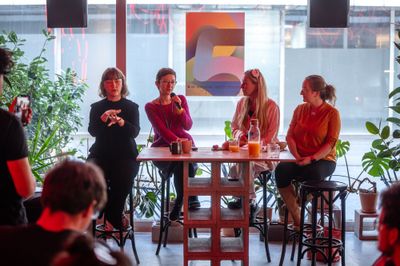
This year, we will open the weekend festival marathon with the director of One World, Eva Križková, her guests, and, naturally, with a delicious breakfast. Come in person to get the latest festival updates, meet film-makers from different corners of the world, and be among the first to find out who has won the Sakharov Prize for Freedom of Thought this year.
The One World Breakfast is brought to you in cooperation with the Slovak office of the European Parliament.
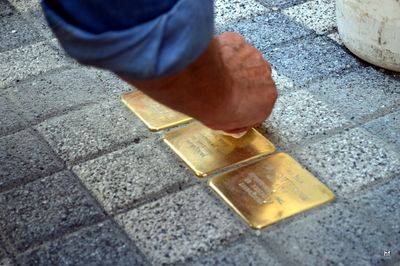
Guided walk through the historical centre of Bratislava with stops at the Stumbling Stones (Stolpersteine) commemorating the victims of Nazism outside the houses where they lived. You will be given the opportunity to be part of their legacy during the event. You can find out more about the Stumbling Stones on the website of the citizensʼ association antikomplex.sk.
The walk begins in front of Tu_BA – the new premises of the Metropolitan Institute of Bratislava at 4 Štúrova Street.
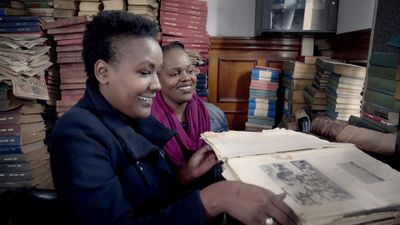
Two intrepid Nairobi women decide to transform what used to be a whites-only library until 1958 into a vibrant cultural hub. Along the way, they must navigate local politics, raise millions for the rebuild, and confront the lingering ghosts of Kenya’s colonial past.
The film screening will be followed by a discussion (in Slovak) related to the film on the conditions, status, and transformations of Slovak institutions and the role of individuals in their development.
Guests:
Monika Lopušanová, director of the library at the Faculty of Arts of Comenius University
Iveta Hurná, director of the P. O. Hviezdoslav Regional Library in Prešov
Ľubica Kollárová, anthropologist, Bratislava City Museum
Hosted by Jana Slezáková, director of the Staromestská Library in Bratislava. The discussion will be conducted in Slovak and will be interpreted into Slovak sign language.
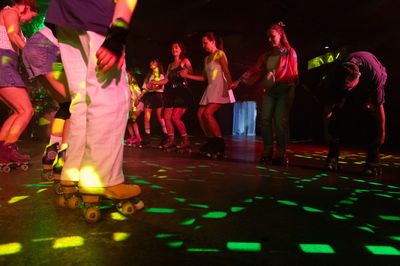
During the One World festival, Natali Dani from Ahojwrld, a roller skating club based in Bratislava, will lead a two-hour workshop. Along with teaching the basics of skating, she will also share the history of roller skating and its connections to social activism. The two-hour session will include short breaks for discussion about both the history and the social changes that this collective activity continues to inspire today.
Programme:
- getting to know each other
- connecting Ahojwrld skating and the One World festival
- warm-up
- learning how to stand still
- learning how to move
- pair skating
- team game
- theory break
- mini choreography, let’s dance
- vibing together on skates to music, and space for individual questions and making friends
All parts of the programme are optional. You can put on or take off your skates at any time, take a break, or go out for a coffee. However, it is important to arrive on time at the start of the workshop, because Natali Dani will be handing out skates to everyone at once. She will show you the best way to put them on, lace them up, and stand on them.
We will stay in the area around the Lumière cinema. The two-hour workshop will take place outdoors on a paved surface. If you want to sit and rest, we’ll be sitting on the ground, so we recommend bringing a blanket, cushion, or sweatshirt if you don’t want to sit directly on the dirty concrete.
Roller skating requires at least a small amount of muscle strength to help your body maintain balance. The first steps can sometimes feel awkward, but Natali Dani will guide you throughout the workshop, explaining how to find your balance during the different movements. Make sure to bring your own helmet and wrist, knee, and elbow pads. Each participant is responsible for their own safety. Parents or guardians are responsible for participants under the age of 18.
During the workshop, there will be music and we’ll have fun and goof around, all of which is a part of roller skating.
To officially register for the workshop, please fill out this online form:
*This form can only be used to register one person. To register multiple people, submit one registration, then reload the page and continue with the next person.
*Registration is open until 24 October at 5:00 PM.
Viktor, a young deaf man in Kharkiv, watches warily during the early days of the Russian invasion of Ukraine. A fan of samurai films and raised on stories of war he dreams of becoming a warrior but is repeatedly denied when he tries to enlist. Eager to find purpose, Viktor embarks on a quest to find his place in the midst of a war he cannot hear.
The film is also accessible to blind and deaf viewers.
Julianna Cvitkovičová, a member of the festival's programming team, will introduce the film in Slovak Sign Language with interpretation into Slovak.
The film will be screened in cooperation with the Ukrainian Institute.
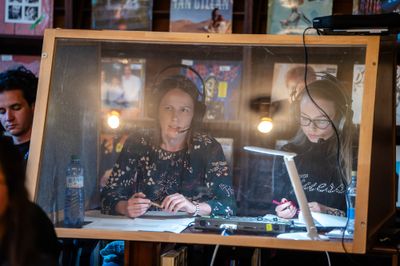
Imagine this: You walk into a cinema, full of excitement about the main feature. But soon, your enthusiasm is dampened by the same old barriers. The information is confusing, descriptive subtitles are nowhere to be seen, nor is there any audiodescription or technology you would and should expect. Even though discussions of accessibility and inclusion are ever more widespread and standard, actual film distribution and screenings show that the same still cannot be said about making audiovisual works accessible to people with hearing or vision impairments. Why is that the case?
Now in its fifth year, the annual discussion on accessibility and inclusion in film and cinema for people with sensory impairments will look at the growing number of initiatives across Europe that aim to make film, cinemas, and media more inclusive. Alongside experts in audiovisual accessibility, filmmakers, managers of successful projects, relevant institutions, and community representatives, we’ll explore how the situation has evolved here in Slovakia.
It’s good to see that things are moving forward here too – even if not as fast as we’d hope. Where have we seen genuine improvement, and where are we still caught in a loop? What changes are needed in the system to make cinemas truly open spaces? What’s the cost of accessibility, what are we losing out on, and how much could we gain if we got it right? And who bears the responsibility?
Join us for an open debate and add your voice to the discussion on (un)met accessibility standards, where technical solutions fall short, and what needs to change to make the cinema experience something everyone can enjoy.
Guests:
Josélia Neves, world expert in accessibly and inclusive design, Portugal.
Joanna Stankiewicz, head of development, promotion and public engagement for the international project Cinema Without Barriers, ZAMEK Culture Centre in Poznan, Poland.
Richard Kováčik, cinema programmer, board member of the Slovak Audiovisual Fund
Renáta Majerčáková, representative of the Deaf community, member of the Slovak Association of Deaf Youth Clubs Committee.
Peter Kozák, representative of audiences with vision impairment, actor, marketer.
Hosted by Emília Perez, accessibility expert, Department of Translation Studies, Faculty of Arts, Constantine the Philosopher University in Nitra.
Simultaneous interpretation from / into Slovak sign language will be provided for both deaf and hard-of-hearing attendees, as well as from Slovak into English.
The panel discussion is co-organized by the Department of Translation Studies, Constantine the Philosopher University in Nitra, as part of the VEGA 2/0092/23 project Translation and Translating in the History and Present of the Slovak Cultural Space.
Free admission
Filmed over five years, Writing Hawa is the story of three generations of Hazara women from the same family in Afghanistan. With unique access, director Najiba Noori films her mother Hawa and her niece Zahra in their aspirations to emancipate themselves from patriarchal traditions. Forced into marriage as a child, Hawa is already 52 years old when she can truly start learning to read and write. With the support of her daughter, she opens a small textile business: she looks for traditional Hazara embroideries in the Bamiyan region and turns them into modern dresses to sell in Kabul. Hawa eventually saves her granddaughter Zahra from her abusive father in a remote village and brings her to the capital Kabul. There, they study together and make plans for the future. However, the takeover by the Taliban in August 2021 turns the lives of the three women upside down: Zahra has to return to the village she escaped from, and Najiba is forced to flee the country, to live as a refugee in France. From afar, she helps Hawa continue to fight for her dreams.
The screening is also suitable for parents with babies and small children. A parent can go to the cinema with a stroller. No commercials or spots are played before the screening. The projection has a reduced volume and a slight light remains in the cinema hall during the projection. In the screening room, movement and commentary on the film are respected. The capacity of the screening room is not fully filled. The projection may be suitable for people with autism spectrum disorders and otherwise neurodivergent people. Older children can be supervised by the festival staff outside the cinema hall. Autumn creative activities will be prepared in the next room.
If you are interested in babysitting, please let us know: katarina.galisinova@clovekvohrozeni.sk.
